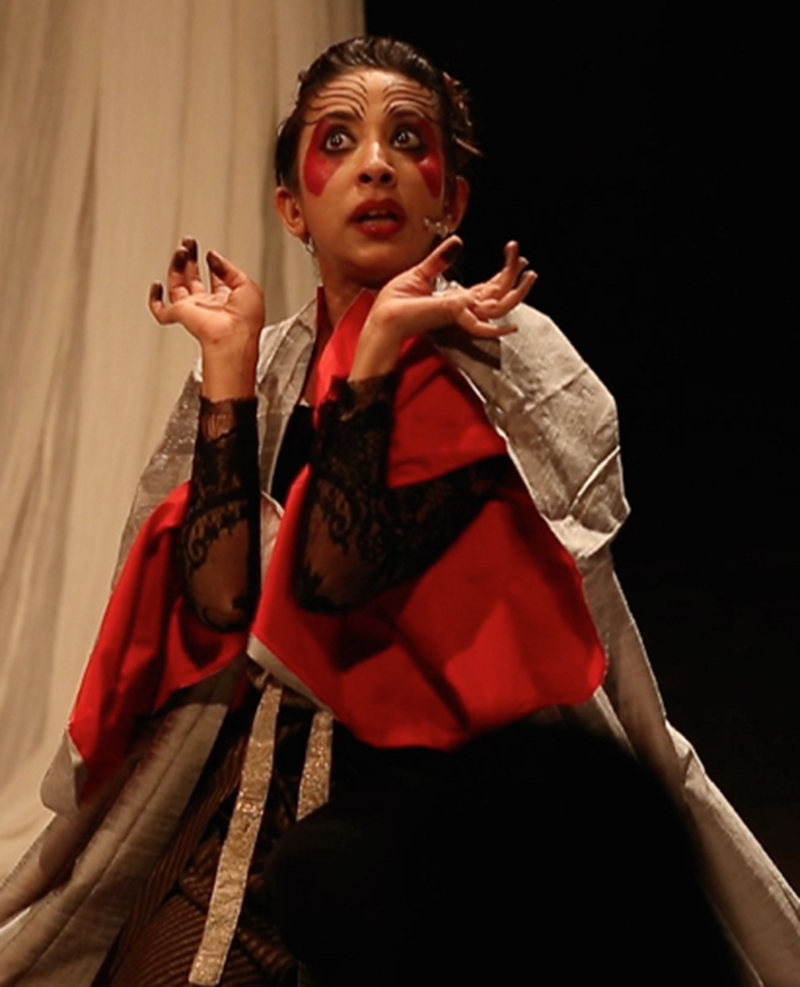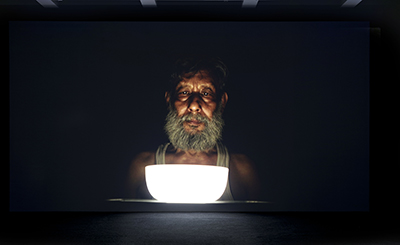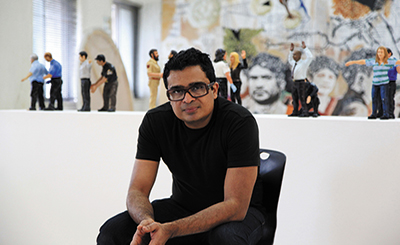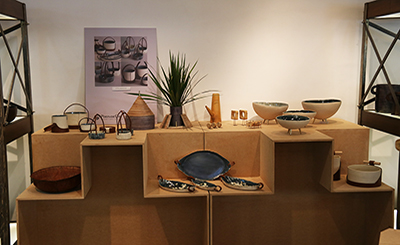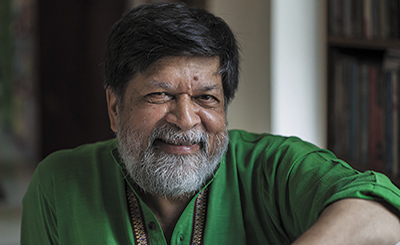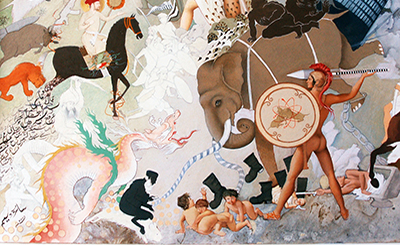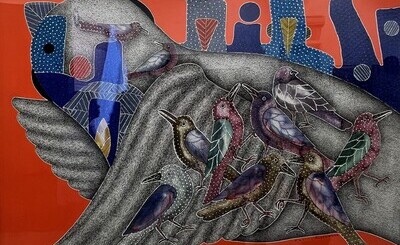
Mumbai-based theatreperson Yuki Ellias. Photos courtesy: Yuki Ellias
Yuki Ellias won this year’s Mahindra Excellence in Theatre Award in the Best Actor (Female) category for Elephant in the Room, a play that reinvents the myth around Ganpati
Mumbai-based theatre person Yuki Ellias won this year’s Mahindra Excellence in Theatre Award (META) in the Best Actor (Female) category for Elephant in the Room, a play that reinvents the Ganpati myth. The play, directed and enacted by Ellias, also won the Best Costume and Best Light Design awards. The story of Master Tusk, a boy who has an elephant head and searches for his missing one, for Elephant in the Room shows how he comes to terms with his identity.
Ellias played Hermia in Tim Supple’s exuberant production A Midsummer Night’s Dream and was also the movement director for his opera, Mozart’s Magic Flute. She played Brooke in Atul Kumar’s Noises-Off and Portia in Merchant of Venice, directed by Vickram Kapadia.
Ellias is currently working with Mahesh Dattani on the film version of his play, Final Solutions, as the movement director. Elephant in the Room will also be staged at the Prithvi Theatre on April 18 and 19. Ellias says she seeks stories in which characters and their lives thrill her. “They thrill me because there is a familiarity in how messed up they are or how much capacity they have to love. It’s the thrill of the humanness of these characters and their rawness that I seek to work with,” she says. Excerpts from an interview:
SHIREEN QUADRI: In Elephant in the Room, a solo show, you play eight different characters. The play is an interpretation of the mythological figure of Lord Ganesha. How different was it thematically and stylistically to do this play?
YUKI ELLIAS: Elephant in the Room is about a boy in search of his missing head. We’re all looking for something, aren’t we? For me, it was that “missing story”, the missing perspective in the Ganesha myths. I had been seeding the story for a few years. I had many questions about this particular and peculiar elephant-boy. What if he didn’t like his elephant head… what if he went to find his old head...what about the elephant who lost his head for the boy?
I was initially thinking of a big cast for the play and a male actor was the obvious choice for playing the elephant boy. And then Ranvir Shah and Prakriti Foundation reached out to me saying they were looking to commission a solo show for the Park New Festival 2016. My best friend suggested I convert the Elephant in the Room narrative into a one-woman performance. For so long, I had always imagined a male lead in this story that I babbled, “How can I cast myself as the elephant boy?”. And he coolly countered... “why not?” A good question and a three months later, I play all 8 characters in the play — Master Tusk, the elephant-boy, a spider, a hunter, an old elephant, a cheetah, a hyena and the personifications of Day and Night. Thanks to the very generous grant and good friends who put me in touch with Sneh Sapru, a fabulous writer and wonder-collaborator, a seed of an idea grew into a powerful script. Adriel George and Prutu Parab created a musical score that is magical. We worked on every layer of the music, identifying instruments and rhythms for each character and scene. Sumaiya Merchant, the costume designer, and I researched the Asian aesthetic-Taiwanese and Korean dance-theatre robes and textiles ...I knew the colours of the play would be white, grey, red, black and orange. The set was inspired by a series of textile installations I had seen. The choreography and performance came naturally in response to the words and music and costume. Asmit Pathare created a light design that transports us all to that wonderland. When I have to get on stage, I look forward to story, the verse, and the world we create. I carry every inch and word and note of the whole journey in me. The experience surpasses just being an actor playing a role. It’s about the story we have created and how we are sharing it with our audiences.
SHIREEN QUADRI: Most of your productions are, in a way, commentaries on social conditions. How do you approach theatre? Has education in theatre helped you understand the finer nuances of the craft better?
YUKI ELLIAS: I have made and performed in a handful of plays. In no way do I seek the plays that are commentaries on social conditions. It may have been mere coincidence. I have no agenda with my work as a starting point. I seek stories in which characters and their lives thrill me. They thrill me because there is a familiarity in how messed up they are, or how much capacity they have to love. It’s intriguing why they shut themselves in or when will they become who they want to be. I love madness and passion. I’m also terribly soppy and thus it’s the thrill of the humanness of these characters and their rawness that I seek to work with.
SHIREEN QUADRI: Your productions also stand out for their innate energy. In acting, how much does a character’s physicality appeal to you? As an actor and director, what are the various aspects of juggling both medium you find fascinating?
YUKI ELLIAS: I love being in my body and it’s when I’m on stage that I get to be most complete with my body. I think everyone in general should be moving with more ridiculousness and sensuousness, both poetically and alarmingly. Luckily, as actors, we have the liberty to be rich with our bodies on stage. It is incredible how we humans have so many ways to move and yet we are so damn boring with our everyday coded way of inhabiting our bodies.
SHIREEN QUADRI: In acting, is there any code/method you follow? How crucial have clowning, improv, commedia dell’arte or mime been to your evolution as an actor?
YUKI ELLIAS: All the styles you have mentioned have contributed immensely to the performer I am today. As a woman, I truly felt liberated in these forms. It helps one break the patterns of feminine stereotypes. One plays a man, a woman, a beast, a tree, air or water. We roll, jump, cackle, grab or fart and everything/everyone on the stage becomes larger than life. It’s fun. It’s beautiful. And it’s fulfilling. Also these forms make one take oneself less seriously as an actor. It helps one become less self-conscious and helps an actor shed all unnecessary inhibitions. It makes one truly liberated in every which way. An actor can make the world laugh by showing a character’s lovable foolishness under all their pretentious garb, then the actor too should be able to look at her/himself in the mirror and laugh at their own silly preciousness.
Page
Donate Now
More from Arts
Comments
*Comments will be moderated




